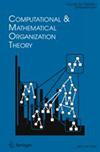理论化变得个人化:独立工作镜像中的管理学术界
IF 1.5
4区 管理学
Q3 COMPUTER SCIENCE, INTERDISCIPLINARY APPLICATIONS
Computational and Mathematical Organization Theory
Pub Date : 2023-01-01
DOI:10.1177/26317877231153188
引用次数: 0
摘要
随着全球研究思想市场的兴起,以及教学职位的日益不稳定,学术劳动比以往任何时候都更像独立工作者所面临的条件。我们在连接这两个世界的过程中认识到这一点,这两个世界在制度上如此不同,但在存在上却如此共鸣。对于独立工作者和学者来说,必须应对的自由、个人投资工作以及所经历的不稳定,都导致了人们对生产率的痴迷,认为这是一种管理工作中强烈而矛盾的情绪的方式。这篇文章提供了一个解读这种痴迷的镜头,并提供了一些建议,通过培养与重要人物的联系,一个特定的、令人回味的工作场所,舒缓的日常工作,以及一个总体目标,来对抗它,创造一个可行的、充满活力的工作生活。这篇文章认为,如果我们渴望将理论带入生活,我们必须审视那些以理论为生的人的经历。这篇文章聚焦于“作为”学者的个人存在经验,补充了“做”学术界的社会和制度挑战,并认为维持个人对工作的投资对于发展有关当代工作世界的更多元化和更有力的理论至关重要。本文章由计算机程序翻译,如有差异,请以英文原文为准。
Theorizing Gets Personal: Management Academia in the Mirror of Independent Work
With the rise of a global marketplace for research ideas, and the increased precarity of teaching positions, academic labor occurs more so than ever in conditions that resemble those faced by independent workers. We came to this realization in the process of bridging these two worlds, so dissimilar institutionally and yet so resonant existentially. The freedom that must be coped with, the personal investment work, and the precariousness experienced, for both independent workers and academics, contribute to an obsession with productivity as a way to manage strong and conflicting emotions attendant to work. This essay offers a lens to interpret that obsession, and some advice for countering it and crafting a viable and vital working life, by cultivating connections to significant people, a specific and evocative place to work, soothing routines, and an overarching purpose. We must examine the experience of those who theorize for a living, this essay argues, if we aspire to bring theories to life. Focusing on the personal, existential experience of “being” an academic, the essay complements work on the social and institutional challenges of “doing” academia, and contends that sustaining personal investment in work is essential to developing more pluralistic and potent theories about the contemporary world of work.
求助全文
通过发布文献求助,成功后即可免费获取论文全文。
去求助
来源期刊

Computational and Mathematical Organization Theory
COMPUTER SCIENCE, INTERDISCIPLINARY APPLICATIONS-MATHEMATICS, INTERDISCIPLINARY APPLICATIONS
CiteScore
3.80
自引率
16.70%
发文量
14
审稿时长
>12 weeks
期刊介绍:
Computational and Mathematical Organization Theory provides an international forum for interdisciplinary research that combines computation, organizations and society. The goal is to advance the state of science in formal reasoning, analysis, and system building drawing on and encouraging advances in areas at the confluence of social networks, artificial intelligence, complexity, machine learning, sociology, business, political science, economics, and operations research. The papers in this journal will lead to the development of newtheories that explain and predict the behaviour of complex adaptive systems, new computational models and technologies that are responsible to society, business, policy, and law, new methods for integrating data, computational models, analysis and visualization techniques.
Various types of papers and underlying research are welcome. Papers presenting, validating, or applying models and/or computational techniques, new algorithms, dynamic metrics for networks and complex systems and papers comparing, contrasting and docking computational models are strongly encouraged. Both applied and theoretical work is strongly encouraged. The editors encourage theoretical research on fundamental principles of social behaviour such as coordination, cooperation, evolution, and destabilization. The editors encourage applied research representing actual organizational or policy problems that can be addressed using computational tools. Work related to fundamental concepts, corporate, military or intelligence issues are welcome.
 求助内容:
求助内容: 应助结果提醒方式:
应助结果提醒方式:


